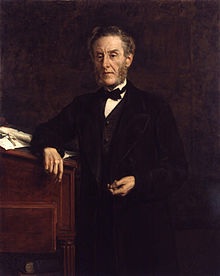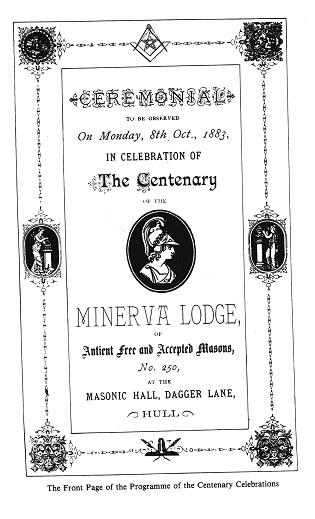Post Industrial Revolution
 The use of machines was now well established in King's Town upon Hull, and docks to accommodate the growing fishing industry as well as shipping all over the Empire were built. While the whaling industry was on the decline, deep sea fishing was beginning. Junction Dock, between the Old and Humber Docks had been opened in 1829 was renamed Prince's Dock in honour of a visit from Queen Victoria and Albert, Prince Consort in 1855. The Victoria Dock had been built in 1n 1850. The population of Hull in 1851was 57,484; ten years later it had expanded to 93, 995. By 1891 it was 199,134.
The use of machines was now well established in King's Town upon Hull, and docks to accommodate the growing fishing industry as well as shipping all over the Empire were built. While the whaling industry was on the decline, deep sea fishing was beginning. Junction Dock, between the Old and Humber Docks had been opened in 1829 was renamed Prince's Dock in honour of a visit from Queen Victoria and Albert, Prince Consort in 1855. The Victoria Dock had been built in 1n 1850. The population of Hull in 1851was 57,484; ten years later it had expanded to 93, 995. By 1891 it was 199,134.
While there was still a huge divide between upper and lower class, Hull was enjoying a period of prosperity. Pearson Park was established in 1860, Hull Football Club was founded in 1865, soon trams were going to be in operation, Marfleet was becoming part of the borough. Hull Kingston Rovers began in 1882 when a group of apprentice boilermakers in the Hessle Road area of Hull came together to start a team.
City status was not to be realised until 1897, but the East Yorkshire town was becoming not only a major port but a significant contributor to the nation's economy and food supply.
 One distinctive personality in the Minerva Lodge who did much to improve conditions for the lower classes was Lord Ashley, aka Anthony Ashley Cooper, Earl of Shaftsbury. Born in London in 1801, he studied at Harrow and Oxford. He stood as a member of Parliament for Hull, and his campaign chairman, Anthony Bannister was a Mason, and this possibly persuaded the aristocratic Earl to join Minerva Lodge in 1861. A social reformer, he is probably best known for instigating the Lunacy Act of 1845, the Factory Acts of 1847 and 1853 and his work to help the boy chimney sweeps in his capacity as Chairman of the Climbing Boys Society; five to ten year-olds were used in the most appalling manner, and Ashley's unremitting efforts to improve their lot had real meaning in Victorian society. He became president of the Ragged Schools Union - supporting education for poor children. He became known as "The poor man's earl." He was also a leading figure in 19th-century evangelical Anglicanism.
One distinctive personality in the Minerva Lodge who did much to improve conditions for the lower classes was Lord Ashley, aka Anthony Ashley Cooper, Earl of Shaftsbury. Born in London in 1801, he studied at Harrow and Oxford. He stood as a member of Parliament for Hull, and his campaign chairman, Anthony Bannister was a Mason, and this possibly persuaded the aristocratic Earl to join Minerva Lodge in 1861. A social reformer, he is probably best known for instigating the Lunacy Act of 1845, the Factory Acts of 1847 and 1853 and his work to help the boy chimney sweeps in his capacity as Chairman of the Climbing Boys Society; five to ten year-olds were used in the most appalling manner, and Ashley's unremitting efforts to improve their lot had real meaning in Victorian society. He became president of the Ragged Schools Union - supporting education for poor children. He became known as "The poor man's earl." He was also a leading figure in 19th-century evangelical Anglicanism.
The Minerva Lodge was on the rise, and a committee was formed to consider accommodation, and the possibility of building elsewhere. Arden's suggestion of using the old St Luke's Church in Nile Street was rejected. Nonetheless a building fund was mooted and decided upon. In 1862 other sites were considered but turned down in favour of improving the current premises at Dagger Lane.
In March 1867 Provincial Grand Chapter was held in Minerva Hall, and the following year in the Town Hall, under the auspices of Minerva Lodge.
In 1873 the Earl of Zetland, PGM of England and Prov. Grand Master of N&E Yorks died. Lodges were placed in mourning for six months.
In 1874 the heir apparent became a Freemason and the Craft suddenly became very popular as the His Royal Highness the Prince of Wales appeared frequently in public as Grand Master, both home and abroad, laying the foundation stones of [ublic buildings, dockyards, churches etc. with Masonic ceremony. Freemasonry was very much in the public eye.
In Hull, the Chapel Trustees decided they were going to sell the property in 1874, and after discussion, the Minerva Brethren decided to purchase the freehold of both the lodge and the Chapel. This cost £1500, and necessary alterations another £500, but the whole of the premises now belonged to the Minerva Lodge. It was almost two decades, however, before the Lodge building was closed for extensive alterations - redecorating, inproving the dining room, and installing electric lights, during which time the Minerva Brethren enjoyed the hospitality of De la Pole Lodge 1605 (meeting in Kingston Square) and Humber Lodge 57. An organ was built by subscription and presented to the Lodge.
 Mention should be made of the Centenary of the Minerva Lodge, celebrated on 8th October 1883, which took place at Dagger Lane. The following article appeared in the local newspaper, the Hull Packet on Friday 12th October 1883; there was no suspicious veil of secrecy drawn over Lodge activities then:
Mention should be made of the Centenary of the Minerva Lodge, celebrated on 8th October 1883, which took place at Dagger Lane. The following article appeared in the local newspaper, the Hull Packet on Friday 12th October 1883; there was no suspicious veil of secrecy drawn over Lodge activities then:
FREEMASONRY. - MINERVA LODGE NO. 250, HULL. -
On Monday evening, the members of this lodge met at their Masonic Hall, in Prince-street, to celebrate the centenary of the lodge. There was a very large attendance of members, and the chair was occupied by the Worshipful Master of the lodge (Bro. the Rev H. W. Kemp, M. A.) who was supported by the immediate Past Master, Bro. W. Holder, and the Deputy Provincial Grand Master (Bro. J. P. Bell. M. D., J. P.), and a distinguished assemblage of provincial past and present officers of the Riding, the Worshipful Masters of the Hull and neighbouring lodges, and many visitors. The Lodge having been opened in accordance with the custom of the craft, the brethren present joined in chanting the Psalm, "Behold, how good and pleasant a thing it is for brethren to dwell together in unity!" The Worshipful Master then addressed the brethren on the object of the meeting, and congratulated the members of the lodge on attaining their centenary. The original warrant of the lodge, together with the centenary warrant, was then read by the secretary of the lodge, Bro. M. C. Peck, jun., P. M.., Provincial Grand Secretary, who afterwards read a most interesting sketch of the history of the lodge from its foundations, on the 8th October, 1783, the meetings of the lodge being then held in the Masons' Arms, Chapel-lane, under the presidency of the first Worshipful Master, Bro. Edward Coulson, a merchant of High-street. A full musical service followed, and the ceremony of the evening was brought to a close by the singing of the Masonic anthem, "Hail, Masonry divine!" A banquet followed.
In 1886 the Centenary of the Minerva Chapter was celebrated, and a sketch of its history read by the Scribe E.
The Freemasons of Hull gave a Queen's Jubilee Tea to 800 poor persons, in the Artillery Barracks in 1887.
In 1893 (October - December) the Lodge premises were thoroughly redecorated and electric light fittings were installed. The Humber Lodge kindly permitted the Minerva Brethren to hold meetings in their Masonic Hall in the interim.
On 6th July 1897, in commemoration of her Diamond Jubilee, and in response to a petition from the Lord Mayor and Hull's three MPs, Queen Victoria declared "Our said town and County of Kingston upon Hull shall henceforth for the future and for ever hereafter be a City and shall be called and styled "The City and County of Kingston upon Hull."

